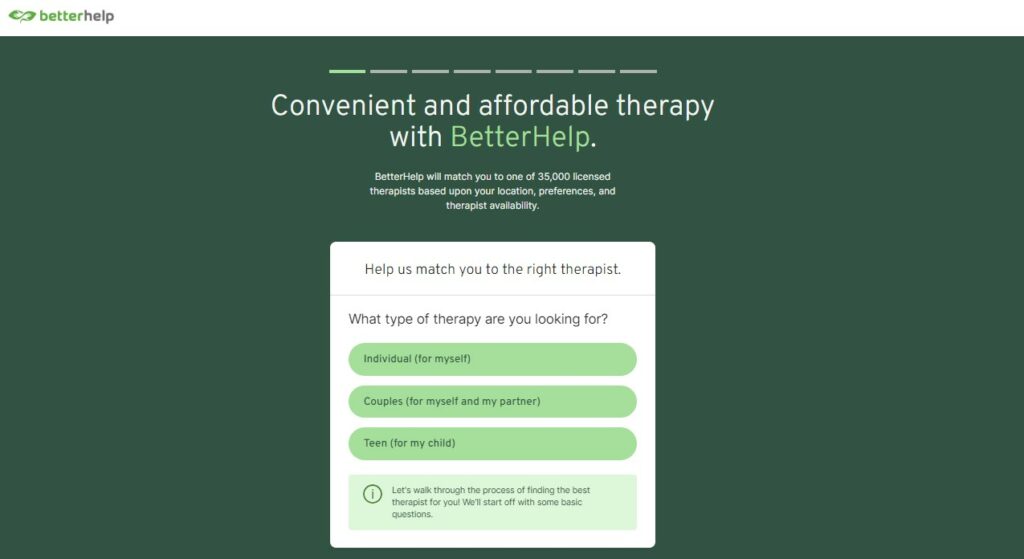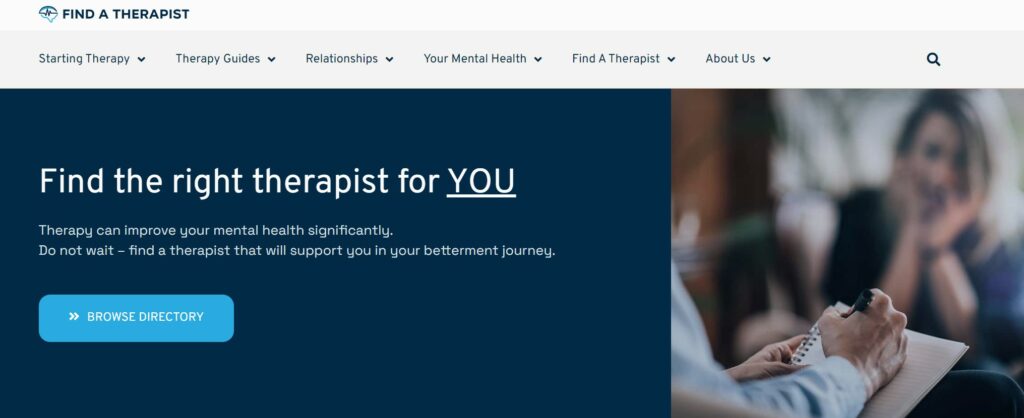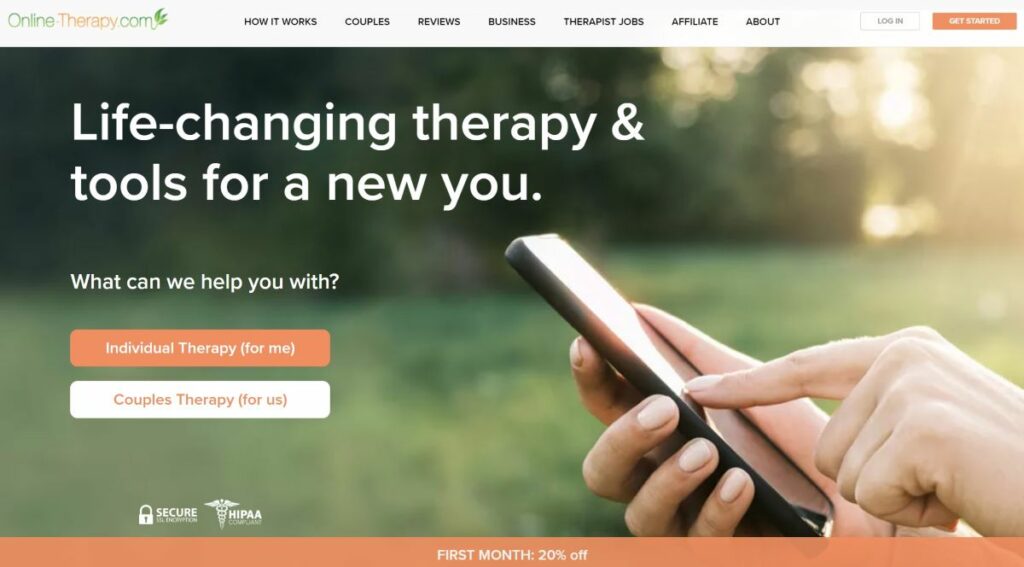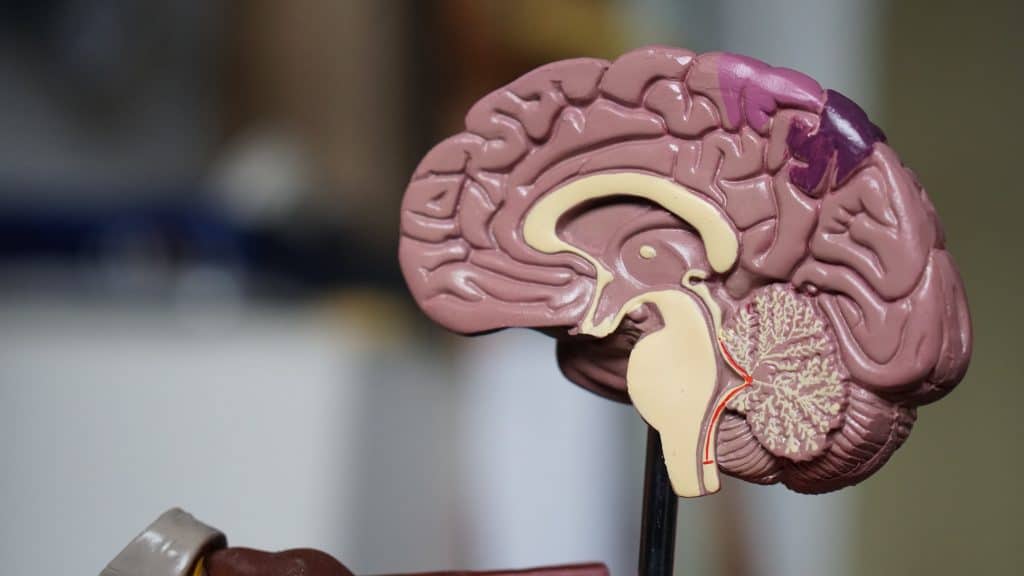Post-traumatic stress disorder (PTSD) is a mental health condition that can develop in response to a traumatic event in your past.
Although it is normal to feel sad, frightened, and/or depressed after a terrifying event, you may have PTSD if these feelings do not fade over time, or if you experience other prolonged symptoms related to the incident you went through.
In this article, we are explaining how to find a therapist who specializes in helping those with symptoms related to PTSD.
Want to skip right to the suggestions for PTSD therapists? Here are our 6 recommended therapy solutions:
PTSD therapists near me
Below, we are taking a look at six services that can connect you with a PTSD therapist. Some of these services offer online therapy, considering that sometimes finding a specialized therapist near you can be challenging.
| Povider | Good For | Location | Pricing |
|---|---|---|---|
| BetterHelp | Quick match with the right therapist four you | Online therapy | $65 to $90 per week (billed every 4 weeks) |
| Find-a-therapist.com | Finding and contacting the right therapist for you | Online and in-person therapy | Varies depending on the counselor fee |
| Online-therapy.com | Finding licensed and experienced therapists with a Cognitive Behavioral Therapy (CBT) approach | Online therapy | $40/week to $88/week (including our 20% discount first month) |
| Calmerry | Depression therapy, online grief counseling, anxiety therapy, therapy for OCD, self-esteem therapy | Online therapy | $49.50 to $73.75 per week (billed monthly) |
| TalkSpace | Depression, anxiety, bipolar disorder, OCD, PTSD, LGBTQIA+ therapy | Online therapy | Varies according to insurance coverage or self-pay options |
| ISTSS Directory | Finding and contacting the right therapist for you | Online therapy and in-person therapy | Varies depending on the counselor fee |
1. BetterHelp

Explore emotional well-being with BetterHelp – your partner in affordable online therapy. With 30,000+ licensed therapists and plans starting from only $65 per week, BetterHelp makes self-care accessible to all. Complete the questionnaire to match with the right therapist.
- Good for: Quick match with the right therapist four you.
- Location: Online therapy.
- Pricing: $65 to $90 per week (billed every 4 weeks).
- Features: iOS and Android app available, message your therapist anytime, live sessions are scheduled weekly and done via live chat, phone, or video call.
BetterHelp is an online platform that can connect you with a PTSD counselor over the Internet. When you sign up, you’ll get to answer some questions related to your issue, and you’ll have the opportunity to state your preferences in a therapist, such as their gender. Then, BetterHelp will match you to the best PTSD therapist for your specific needs.
Read our BetterHelp review here.
2. Find-a-therapist.com

- Good for: Finding and contacting the right therapist for you.
- Location: Online and in-person therapy.
- Pricing: Varies depending on the counselor fee.
- Features: Filter your search, find accessible and effective online and in-person therapy, find guides on different types of therapy.
Find-a-therapist.com is a platform that empowers users to tailor their quest for therapists by considering multiple factors like therapy type, specific concerns, therapist gender, spoken languages, and more. This way, individuals can find a PTSD therapist like May Izadi, Lincoln Stoller, or Alle Santiago easily.
3. Online-therapy.com

Discover transformative online therapy with Online-therapy.com. Through cognitive behavioral therapy (CBT), Online-therapy.com offers individual and couples support starting at $45/week. Engage in sessions via video, voice, or text for maximum flexibility. Fill out their online questionnaire to get started.
- Good for: Finding licensed and experienced therapists with a Cognitive Behavioral Therapy (CBT) approach.
- Location: Online therapy.
- Pricing: $40/week to $88/week (including our 20% discount first month).
- Features: Unlimited messaging with your therapist, including a daily journal and activity plan, yoga and meditation videos, and tests to see your progress.
Online-therapy.com features a diverse team of therapists and counselors specializing in Cognitive Behavioral Therapy (CBT), a highly effective approach for addressing and overcoming PTSD. The platform has the flexibility to schedule live sessions based on your preferences and needs.
Read our online-therapy.com review here.
4. Calmerry

Embark on a journey of mental wellness with Calmerry. With diverse subscription options, starting at just $50, Calmerry makes prioritizing your mental health simple and accessible. You can message your therapist any day or schedule a live therapy session from the comfort of your home from any device.
- Good for: Depression therapy, online grief counseling, anxiety therapy, therapy for OCD, self-esteem therapy.
- Location: Online therapy.
- Pricing: $49.50 to $73.75 per week (billed monthly).
- Features: Message to your counselor anytime, text therapy and video therapy according to the plan you choose, free counselor switching.
Calmerry is an online counseling platform that employs evidence-based approaches to deliver mental health care to its clients, including PTSD therapy. Every therapist on the platform is licensed and certified as a qualified professional.
Read our comparison between Calmerry and BetterHelp here.
5. TalkSpace

Tailored to individuals, couples, teens, and offering psychiatry services, Talkspace plans kick off at a wallet-friendly $69 per week. What’s more, many health insurances also cover their services, enhancing accessibility and affordability. Complete a questionnaire and get matched with the right therapist for you.
- Good for: Depression, anxiety, bipolar disorder, OCD, PTSD, LGBTQIA+ therapy.
- Location: Online therapy.
- Pricing: Varies according to insurance coverage or self-pay options.
- Features: Accepts insurance, pick your therapist from a list of recommendations, live video sessions and unlimited messaging with your therapist, medication management.
In TalkSpace you must answer some questions to be matched with a list of PTSD therapists according to your needs and preferences. Then, you can check their profiles and pick the one you feel is more adequate for you.
Read our TalkSpace review here.
6. ISTSS Directory

- Good for: Finding and contacting the right therapist for you.
- Location: Online therapy and in-person therapy.
- Pricing: Varies depending on the counselor fee.
- Features: Online directory, use the filters available to narrow down your search results, contact the therapist you choose directly.
The International Society of Traumatic Stress Studies (ISTSS) has an online directory of PTSD therapists, allowing you to easily locate a licensed counselor near you. Using their website, you can by inputting your location, find a list of qualified PTSD therapists available nearby.
Which Factors Can Make You More Prone to Developing PTSD?

PTSD can develop at any age, but some risk factors increase the chance of developing PTSD.
- Substance abuse-related issues such as drinking and drug usage.
- Trauma experienced at an early age (involving childhood trauma).
- The nature of your profession, such as emergency workers and combat soldiers.
- Mental health-related issues like depression and anxiety.
What Affects the Severity of PTSD Symptoms?
Two people who experience the same traumatic event may present with different levels of PTSD symptoms or some with none at all. One person may be extremely affected by what they experienced, while another individual may be able to overcome the trauma relatively quickly.
There are a few different factors affecting the severity of PTSD symptoms that you may present with.
- The temperament traits you inherit from your ancestors can lead to a predisposition of developing PTSD. Some people are naturally better at processing stressful and traumatic events than others.
- The regulation of neurotransmitters and hormones in the brain can affect PTSD symptoms. Hormones and brain chemicals help in stress management, and dysfunctional regulation can reduce our ability to control stress.
- Mental health issues of the inherited kind can lead to PTSD, for example, a history of depression and anxiety in the family line.
There is nothing wrong with experiencing PTSD, no matter how significant or insignificant the perception of the event(s) that led to your symptoms is. With the right help, you can overcome previous trauma, and regain control of your thoughts and feelings.
PTSD Symptoms

Development of PTSD symptoms may vary from person to person, because of the nervous system response and stress tolerance of every person’s individuality. The symptoms may appear hours after a traumatic incident for some people, while it may take days or weeks to appear in others.
Although symptoms of PTSD present differently from person to person, they are generally divided into four main types.
1. Intrusive and Disturbing Memories
You may experience intrusive thoughts, such as:
- Re-experiencing unwanted, stressful, and disturbing memories.
- Flashbacks of the negative event that make you feel like it is repeatedly happening.
- Recalling moments of emotional or physical distress.
2. Avoidance and Numbing
Numbing and avoidance include the following symptoms:
- Avoiding thoughts related to past traumas.
- Avoiding social activities and places that may trigger flashbacks or remind you of the incident.
- Feeling emotionally detached and numb.
3. Mood Changes and Negative Thoughts
PTSD may also affect your mood and regular thought patterns, resulting in:
- Being overwhelmed by negative thoughts.
- A failure to maintain close relationships.
- A feeling of helplessness and loneliness.
4. Emotional and Physical Changes
Emotional and physical changes are also known as hyperarousal symptoms, and they may include the following:
- Aggressive behavior
- Sleep problems.
- Difficulty concentrating on work or study.
- Irritability, and feeling anguish.
- Self-destructive behavior, such as alcoholism.
- Getting frightened and anxious easily.
PTSD and the Nervous System

During a stressful event, your nervous system activates your fight or flight response, resulting in an increase in heart rhythm and blood pressure, muscle stiffness, reduced reaction time, and increased strength.
After the end of the stressor, your nervous system returns your body functions to normal by decreasing your heart rate and blood pressure.
In some cases, the sheer amount of stress you’ve faced does not allow the nervous system to normalize your body functions again after experiencing a stressful event. The nervous system remains stuck in fight or flight mode, even after the event has passed, leading to PTSD.
Giving your nervous system a chance to correct the patterns of engaging in an intense response after a stressful event can help you to overcome PTSD symptoms.
Common types of PTSD
There are a number of common types of PTSD that different therapists may specialize in helping you with.
PTSD in military personnel
Military personnel performing duties in war zones often experience PTSD, especially after returning home or retiring.
This is due to the stress and horrors of war, which soldiers often find imprinted in their memory. PTSD is especially likely to be experienced by military personnel returning from active combat.
PTSD due to psychological trauma
You may experience a stressful event or sequence of events that leaves you emotionally numb and detached and shatters your sense of security. It can be very difficult to overcome such a psychologically traumatizing experience.
PTSD due to psychological trauma is often connected to childhood experiences, but it can occur at any age.
PTSD due to rape or sexual trauma
The traumatic memories of being raped or sexually assaulted can result in fear, despair, a sense of shame, and loneliness. These memories often appear through flashbacks and nightmares and are not easy to get rid of.
That being the case, the most important thing is to realize that you can reclaim your self-worth and self-respect, with help from a therapist and alleviate the symptoms of PTSD.
PTSD due to racial trauma
PTSD may develop due to continuous racial abuse, injustice, and prejudice within our culture and society. In response, you may feel worthless, helpless, or hopeless.
Racial trauma may also lead to negative thoughts, hypervigilance, and mood changes as found in other forms of prolonged trauma response.
Therapies used in PTSD treatment

There are different types of treatment being used to help with PTSD, depending on the experience you’ve been through, the symptoms you present with, and the specialties/qualifications of the therapist you connect with.
Cognitive-Behavioral Therapy (Trauma-Focused)
Trauma-focused CBT is one of the most effective ways to treat PTSD. In this type of therapy, the therapist identifies and modifies your attitudes toward the traumatic incident you experienced.
Using CBT, the therapist modifies your beliefs and behavior, targeting unhealthy thought patterns that have arisen as a result of the trauma you’ve experienced. They may help you to overcome feelings of shame or helplessness, for example.
Exposure therapy
With this type of therapy, therapists ask you to recall past trauma and fear-inducing memories by speaking or writing about them. Continuous exposure to memories can help you confront these events, and eventually overcome them.
Your therapist can help to guide you through this process, and prevent over-exposing yourself to past memories, to avoid doing further psychological harm.
EMDR Therapy (Eye Movement Desensitization and Reprocessing Therapy)

The information processing system of your brain may be severely affected by PTSD, and EMDR can help to overcome this issue.
This type of therapy is a form of psychotherapy that has components of CBT and exposure therapy but also incorporates saccadic eye movements during exposure. EMDR helps desensitize you to the traumatic memories you have, helping you to overcome PTSD.
Family therapy
Family counseling allows you to discuss matters with loved ones, to help you with your relationship problems.
You may want to bring along your partner to therapy for support, or to help your therapist gain further insight into the effect that PTSD is having on you and your relationships.
Conclusion
PTSD should be taken seriously and often needs to be treated by a professional counselor or therapist, as it can seriously affect your ability to function on a day-to-day basis. The collaborative relationship between the therapist and the individual fosters a safe space for processing emotions, rewriting traumatic narratives, and developing coping strategies.
If you’re still not sure how to find the right PTSD counselor for you, feel free to contact us and we’ll respond as soon as we can.





